Bringing Alive What It Would Mean To Be Free
Stepping into the Future Premiere Celebration in Harlem
December 16, 2013 | Revolution Newspaper | revcom.us
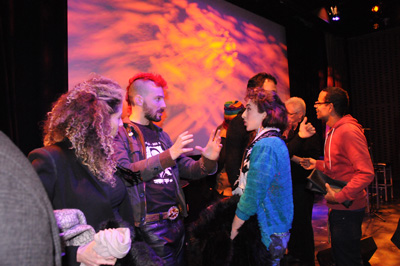 After Stepping Into the Future in Harlem, December 7, performers speak with people in the audience.
After Stepping Into the Future in Harlem, December 7, performers speak with people in the audience.
Saturday night, December 7, at the MIST Harlem Cinema, 125 people gathered with great anticipation to celebrate and view the premiere of Stepping into the Future: On the Occasion of the Publication of BAsics—A Celebration of Revolution and the Vision of a New World, the documentary of the extraordinary April 11, 2011 event marking the publication of the book BAsics by Bob Avakian.
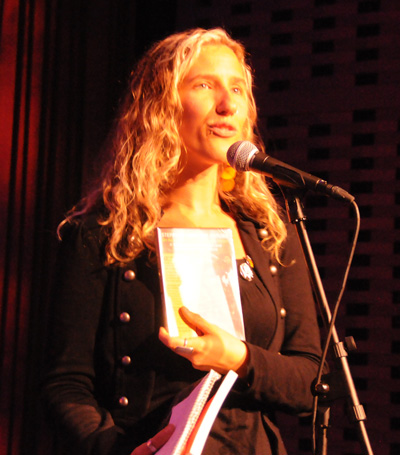
Annie Day, co-director
People experienced the heart and soul of the film, featuring beautiful art and performances and commentary inspired by Bob Avakian's vision and work—bringing alive revolution and the kind of liberated society that could come into being for humanity. In her remarks after the screening, Annie Day, the producer of the April 11 event, said, “What we saw in this film tonight—the diversity of voices, the ferment and creativity that can get kicked off, all coming together from different perspectives but united around the need to wrangle with, to engage and to envision, to be inspired by, the vision of a whole new world… What we saw in this film tonight is a sense of a whole new society, whole new ways of relating. How many times do you see people of different age ranges, different nationalities, different musical genres, who are actually coming together to be about something different?—to be about, as Aladdin says in the film, not just the bling-bling, not just about myself above all else, but to be about something bigger than themselves. That’s just a taste of what humanity could actually live by.”
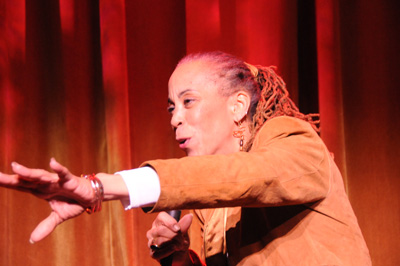
Maggie Brown, performer
It was an evening of what Cornel West called in the film "revolutionary joy." People were talking with each other about things that mattered. People were bouncing off the film—the art, the artists, and BA. A Black woman artist said: “I was thinking ‘this could be a real blueprint.’ But who wants to do the work? Bob Avakian did the work that nobody wants to do. We have all these dreams and goals and visions of a new world—everybody does dream, everybody who has a pure heart does dream of a beautiful world. But we’re always taught: ‘You gotta DIE and go to HEAVEN for all that,’ so you know… But he’s talkin’ about having it here.”
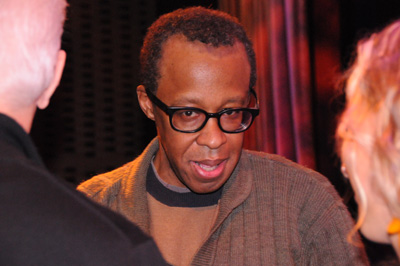
Matthew Shipp, performer
There was excitement in the air from the moment people started coming into the film center—all ages, all nationalities, gathering around the book tables, in the lobby and in the bar before the event began, engaged in animated discussions: Many of the artists who performed at the April 11 event and who appeared in the film were there, one even coming from the Midwest on donated frequent flyer miles... A former prisoner who had to duck out early to meet a homeless shelter curfew… A Somali-born woman from Brooklyn who had received a palm card while shopping in Harlem that day and arrived at the theater 90 minutes early to await the event… An artist and his friend who had to walk over 40 blocks on a very cold night… People who had driven for several hours… Parents of young victims of police brutality… A number of present or recent college students who relate to the cultural scene, several not yet familiar with Bob Avakian.
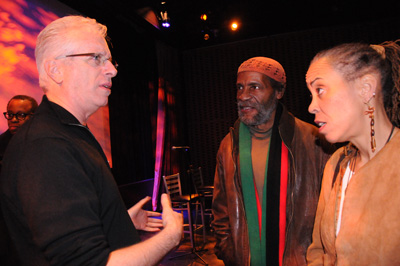
Andy Zee, co-director, with Abiodun Oyewole and Maggie Brown, performers
A significant section of the audience was from Harlem and the Bronx, due to the efforts of many people. Some people had donated tickets (which cost $20) so that no one would be unable to come due to lack of funds. A half-hour before the event, people out on the street doing last minute publicity with posters and palm cards ran into a Harlem woman with her three grandchildren who said, "That's where we're going too. We'll help you." The kids eagerly threw in, and the little boy, who turned 10 years old that night, ran into the shops announcing, "This is what I'm doing on my birthday!" and asking them to put a Stepping into the Future poster in their window. (Several parents brought children of all ages, knowing childcare would be available—but wanted them to experience this event… and even many of the younger children were very absorbed and got a lot out of it.) One of the musicians who came to perform at the event went out with postcards in Harlem in the hour before it began, connecting with and inviting people they knew.
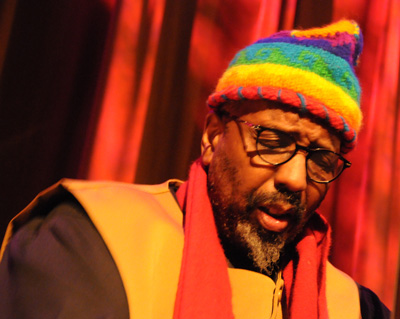
William Parker, performer
Leading up to the movie screening, the celebration featured live performances of four artists who had been on stage at the original April 2011 event and are interviewed in the film. Jazz pianist Matthew Shipp and bassist William Parker did a beautiful and complex duet. Abiodun Oyewole of the Last Poets performed the poem he read at the original event, "Rain of Terror." Looking out at the audience before he started, Abiodun captured much of the sentiment in the room: "Wow, in the middle of Harlem on a December night. This is outrageous. I kind of think we might have a revolution after all!"
Maggie Brown, daughter of the famous singer Oscar Brown, Jr., also evoked the sense of possibility in the air. She did a beautiful rendition of a song she sang in the film, a song that Nina Simone made famous in the '60s, "I Wish I Knew How It Would Feel to Be Free." In Nina Simone’s version you can hear and feel the yearning for a world so different from what we live in now, a world that it seemed could only be imagined. Maggie Brown’s version shared that, but she also altered the last verse subtly to say “I’ll sing because I’m free and you would sing along with me. We’d sing, we’d sing, we’d sing…” as the music faded out. Dreams were beginning to feel more real.
One of the performers present, actor and storyteller Aladdin, described the scene after the live performances, as the film started: “The lights go out and there’s silence, and you could feel the anticipation. And half of the audience is like ‘What is this, what’s going on?’… And then once the event [film] begins and you see the conversations juxtaposed with the performances, there’s a sort of a rhythm, it’s like going to a concert, and the audience was in sync with the tone and the cadence of the movie.”
The film was inspiring and intriguing. It captures the spirit of that April 2011 night that former Black Panther Richard Brown describes as “magical.” Annie Day, the producer of the April 2011 event, ties together the film with descriptions of BA’s work and reflections on how it inspired the extraordinary evening. You see clips of beautiful music by jazz musicians, hip-hop artists, singers, and dancers bringing the audience to their feet, interspersed with readings and commentary from artists, actors, and revolutionaries on how the world could be different, the impact on them of engaging with Avakian’s vision and works, quotes from BAsics, and historical footage of BA’s revolutionary leadership over four decades plus.
People at the premiere were deeply involved in the movie, shouting their appreciation for different artists and murmuring approval of key points made in the archival clips of BA and by others in the movie. After the film, there was a Q&A with co-directors Annie Day and Andy Zee.
Then nearly everyone stayed for a reception where folks who had never met each other gathered around to eat and converse over the biggest questions facing humanity and their deepest feelings about what it means to live under this system, how it got this way, how it could be different and how people can get into this revolution. The room was living and breathing with what the movement for revolution makes real, now, and what kind of new society it is building toward bringing into being. A college student said, “It’s a very positive, high feeling in terms of what it would mean for this to be more and more the culture that we live in.”
Many expressed great hope at seeing and hearing artists and people of many different ages and nationalities coming together and forming a community aiming for a better world, inspired by the vision and leadership of Avakian. A woman in her 20s spoke to how great it was that there were “young kids here, and older people too.” Another woman talked about all the friends she had made. One young woman who brought her two young children said: “I absolutely loved the documentary. I never heard of Bob Avakian [before.]… We’re made to believe that this way of life is the way they have taught us to be, but it’s not like that. I was amazed to see so many people on film who had the same mindset that I have.” At one table a 40-ish Black filmmaker and a 20-something white woman who had never met wrangled about what revolution really means—is it just a change of ideas, or the overthrow of the whole economic, political and social structure… and is such a revolution possible. At least two youngsters circled through the crowd collecting autographs in their copies of BAsics from all the people there who had been in the film.
A recurring theme was how surprised and deeply moved people were by the liberating vision of communism that BA was bringing forward, and the fact that there was a leader working on this way out. This came from different people who themselves were coming from many different perspectives, from a 12-year old girl thinking about what she should do with her life to a middle-aged Black man who identified himself as a capitalist, who wasn’t sure capitalism is really the problem but wanted to hear the plan for solving the horrors confronting the majority of people on the globe. One Black teenager said: “I felt like I was part of a big change. I feel like it was really extraordinary to see that there are people who care and are standing up for us. I think this will change the world a lot. It’s not just for America, it’s for everywhere. In a place like in India there won’t be child brides, communism [will be] so strong that everybody will work together, so there won’t be a higher person, we won’t need that, because everybody will work together and make our world better together.”
People were challenged to be part of the campaign to make BA known everywhere by raising the major funds that can accomplish this. One of the performers in the film commented after the event, “I think that there's wealthy people with a lot of money who are really not happy with how things are and want to see something else and this could be something they are willing to put their money into just to see where it'll go, even if they're not sure...and they say this is something that deserves getting a chance. Because really that's what we need, a chance.”
A group of people from Harlem organizing a bake sale to raise funds for BA Everywhere took orders for pies and cookies, raising $225 on the spot, and distributed a statement one woman wrote about why they are doing this (see box).
The musician William Parker, who had performed at the April 11, 2011 event and at the event this night, said, "I thought the film was great. It had good rhythm, message. The music and feeling was strong. Everyone should be playing it at high schools, colleges. It has to come above ground.” One ex-prisoner said, "This movement is about science. It's coming from an intelligent place," and called his friends in California to tell them to go to the showing in Los Angeles (on the following Wednesday, December 11). People left feeling changed and inspired to have been part of the audience celebrating this premiere showing and wanting to see the film and BA's work known much more widely.
The premiere celebration for the film in Los Angeles took place on December 11: West Coast Premiere of Stepping into the Future: On the Occasion of the Publication of BAsics—A Celebration of Revolution and the Vision of a New World
If you like this article, subscribe, donate to and sustain Revolution newspaper.
